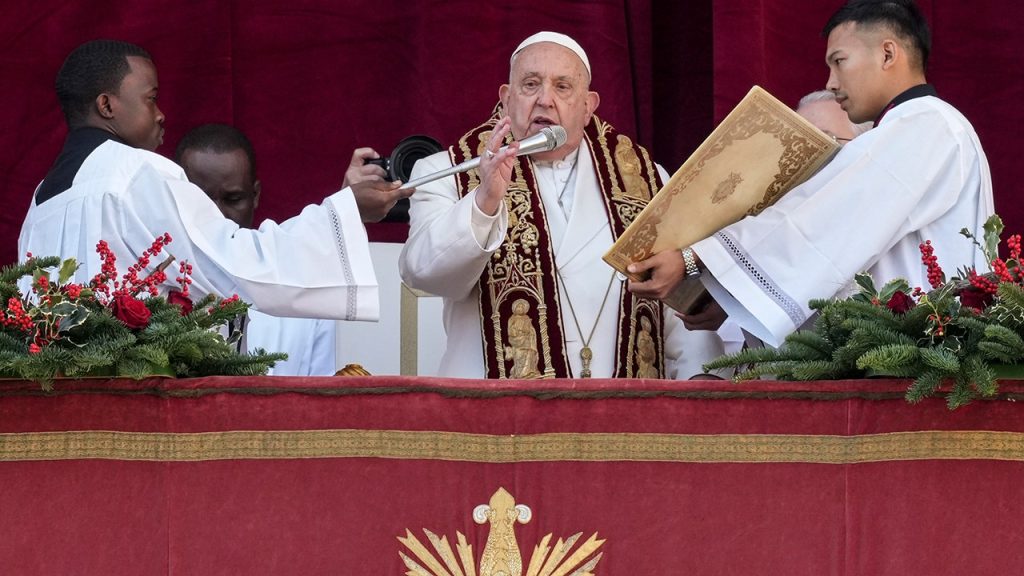Pope Francis’s 2025 Christmas “Urbi et Orbi” message, delivered from the central balcony of St. Peter’s Basilica, resonated with a fervent appeal for global peace and an end to the world’s conflicts. Addressing thousands gathered in St. Peter’s Square, the pontiff’s words carried a particular urgency as he addressed the ongoing war between Russia and Ukraine, imploring for “the boldness needed to open the door to negotiation” and the silencing of weapons. He further emphasized the necessity of dialogue and meaningful encounters to establish a just and lasting peace, echoing sentiments expressed throughout his papacy. This year’s message, delivered during his twelfth Christmas as the leader of the Roman Catholic Church, served as a poignant reminder of the widespread suffering caused by conflicts across the globe.
The Pope’s call for peace extended beyond the immediate crisis in Ukraine, encompassing other regions grappling with political, social, and military unrest. He specifically mentioned Lebanon, Mali, Mozambique, Haiti, Venezuela, and Nicaragua, highlighting the interconnectedness of global peace and the need for concerted efforts to address the root causes of conflict in these diverse nations. This comprehensive approach underscores the Pope’s belief in the universality of peace and the importance of addressing conflict wherever it arises, regardless of its scale or geographic location. His message emphasized that true global peace necessitates a commitment to resolving conflicts across all corners of the world.
The Ukrainian conflict has been a recurring theme in Pope Francis’s pronouncements, and his previous calls for negotiation, particularly suggesting the “white flag” approach, drew criticism from Ukrainian officials who saw it as conceding ground to Russia. This backdrop underscored the sensitivity and complexity of the ongoing conflict, particularly as Ukrainian President Volodymyr Zelenskyy initially ruled out peace talks unless Ukraine’s pre-war borders were restored. However, Zelenskyy’s recent indication of a greater openness to negotiations following Donald Trump’s re-election as U.S. president adds another layer to the evolving political landscape. The Pope’s renewed plea for peace thus comes at a potentially pivotal moment, urging a peaceful resolution despite the complexities and sensitivities surrounding the conflict.
The situation in Gaza, marked by escalating Israeli military operations and the capture of Israeli hostages by Hamas, also featured prominently in the Pope’s message. Renewing his call for a cease-fire and the release of hostages, he expressed grave concern over the deteriorating humanitarian situation in Gaza, pleading for the “doors of dialogue and peace” to be opened. This consistent focus on dialogue and negotiation underscores the Pope’s belief in the power of communication and understanding to resolve even the most intractable conflicts. His appeal reflects the urgency of the situation and the need for humanitarian considerations to be at the forefront of any resolution.
The 2025 Christmas also marked the commencement of the Holy Year celebration, anticipated to draw millions of Catholic pilgrims to Rome. The symbolic opening of the Holy Door at St. Peter’s Basilica, a ritual performed by the Pope himself on Christmas Eve, ushered in this special Jubilee year, dedicated to hope. This ancient tradition, dating back to 1300, offers the faithful an opportunity for spiritual renewal and forgiveness. The convergence of the Holy Year with the Pope’s Christmas message amplified the themes of peace, forgiveness, and hope, highlighting the importance of these values in addressing the global challenges facing humanity.
The Pope’s 2025 Christmas message served as a powerful reminder of the importance of peace and dialogue in a world fractured by conflict. His call for an end to hostilities in Ukraine and Gaza, coupled with his broader appeal for global peace, underscored the interconnectedness of these issues and the urgent need for concerted action. As millions of pilgrims gather in Rome for the Holy Year, his words resonate with a message of hope and the possibility of a more peaceful future, urging individuals and nations to embrace dialogue and strive for a world free from conflict. The commencement of the Holy Year, dedicated to hope, further emphasizes the potential for renewal and reconciliation, offering a powerful symbol of the possibility of a more peaceful and just world.

